Shinjuku Incident, The
Introduction
Once in a while, I get the impression that Jackie Chan is getting too old for kung-fu movies. Not that he actually is too old for kung-fu movies, rather it seems incongruous watching a man in his sixth decade punching out moves that put actors a third his age to shame. It's a little like watching your dad on the dance floor, with the proviso that your dad can actually dance. There's something about it that seems wrong. Fortunately for us, the Jackie Chan kung-fu comedy is a genre that has been consigned to Hollywood, in a succession of films that never really quite live up to their promise, mainly because Hollywood likes its actors neatly pigeonholed. In recent years, Hong Kong cinema has allowed Jackie Chan to explore his talents and demonstrate his versatility. There's a lot more to Jackie Chan than just kung-fu, and The Shinjuku Incident is a film that is totally devoid of martial arts. It's also given me a reason to look forward to a Jackie Chan film once more, after the comparative disappointment of The Myth.
Steelhead was a tractor mechanic quite content with his life in North-eastern China, but the problem was that his childhood sweetheart, Xiu Xiu looked Eastward for a life of wealth and prosperity. She wasn't alone, and many of the villagers wanted to move to Japan to find a better life. Steelhead gave Xiu Xiu his blessing when she promised to return as soon as she made enough money. First Xiu Xiu's aunt in Japan passed away, then the letters dried up, and then Steelhead's friends in Japan told him she had just vanished. And so it was that Steelhead also became one of countless illegal Chinese immigrants to sneak into Tokyo, although his purpose was just to find Xiu Xiu. He finds that life for illegal Chinese in Tokyo isn't easy, constantly wary of the authorities, and having to rely on petty crime to supplement paltry wages from odd jobs, just to make a living. And where there is petty crime, there are the immigrant gangs, and not too far behind the Japanese Yakuza. Steelhead has to let go of his dreams when he learns that Xiu Xiu is now Yuki, and married to a Yakuza boss. Unable to return to China, Steelhead has to make a life for himself in Japan, and the only way to do that is through petty crime, in the hope of one day becoming legal. But petty crime is just the start of a downward spiral, and soon Steelhead finds himself in the middle of a Yakuza civil war.
The Disc
The Shinjuku Incident gets a 2.35:1 anamorphic transfer, and it's my first experience of a Film-PAL native transfer from Cine Asia, which is warmly welcomed. The image is clear and sharp, the colours are a tad over-saturated, but that may be a creative choice, and the only real issue I can find is some slight aliasing. All in all it's a splendid image transfer. In terms of audio, you have the obligatory English dub, which really must be avoided at all costs, mostly for the awfulness of the thing, but also because it erases the language barrier that is a major part of the storyline. The reason for this becomes apparent in the native language audio tracks, DD 5.1 and 2.0, in which the actors speak either Japanese or Mandarin according to their character's ethnicity. It's not an action movie per se, but the 5.1 audio is appreciated for the more strident scenes.
Extras
The Shinjuku Incident is a two-disc release, but you do get a little something on the feature disc as well. That would be animated menus, 3 trailers and 3 TV spots for the movie, and 12 trailers for more Cine Asia product.
Everything else is on disc 2, including some more animated menus, giving away the film's plot.
With over three hours of material on disc 2, there's no absence of quantity, as for quality…
The Interview Gallery contains interviews with Jackie Chan, Daniel Wu, Xu Jinglei, Masaya Kato, Naoro Takenata, Chin Kar Lok, and Pater Kam Pau-Tat. The actors talk about the film's plot, their characters, and relate some of their on set experiences. You have to select the interviews individually, and in total they run to 102 minutes.
The Making Of lasts 17 minutes, with behind the scenes footage, clips from the film, and interview soundbites (most of them repeated from the Interview Gallery).
The Behind The Scenes section takes a look at Preproduction, The Critical Scenes, Action Sequences, The Director, Hong Kong-Japan, Difficulties, Daniel Wu Yin-Ch, and Japanese Fans. Once again you'll have to select these featurettes separately, there is no play all option. The footage is presented as is, with no voice-over to provide context. They run to a total of 105 minutes.
I could find no sign of the deleted and extended scenes mentioned in the PR blurb on this set, so I assume that they are a Blu-ray exclusive.
Conclusion
Jackie Chan as you've never seen him before! And that's even without the sex scene. It's about time that Jackie Chan made a movie like Shinjuku Incident, showing that he has range, and there are many more strings to his bow than just kung-fu comedy. There's very little comedy in The Shinjuku Incident, and no kung-fu whatsoever. What there is, is plenty of drama, and perhaps Jackie Chan's most powerful performance to date. It's a fairly gritty, relentless tale of the immigrant experience, pretty unremitting in violence, and with some harsh things to say about the ethnic divide and racial tensions. It's no wonder that it's been banned on the Chinese mainland.
Of course movies about the immigrant situation aren't rare, and neither are crime dramas about the immigrant situation. Comparisons can instantly be made between this and Scarface, although actually it's more an amalgamation of Scarface and Carlito's Way, although there are a couple of conventions that have to be followed or subverted first. In Bey Logan's commentary for Police Story, he made mention of the expectation that wrongdoing has to be punished. In that film, Jackie's character left behind his oath as a police officer and took the law into his own hands, which is why Hong Kong audiences needed the moral satisfaction of seeing the character in handcuffs at the end of the film. Bearing that in mind, and with Jackie playing an out and out villain in this film, the end has a certain inevitability about it that is apparent from the first frame. Also, unlike Pacino's character in Scarface, Jackie starts the film as the innocent and likeable Steelhead, very much the Jackie character that we have come to expect from his kung-fu comedies, and it's this character that the film smartly subverts, playing with audience expectations. It's circumstance rather than ambition that leads Steelhead onto his life of crime. His intentions are always as noble as possible, in that he wants to better the existence for his fellow illegal immigrants, and it's from relatively harmless, petty crime that he gets sucked in deeper into the violence and immorality of the criminal underworld. The thing is, that he's good at what he does, and though his intentions remain noble, there comes a point where he crosses the line, from well meaning misdemeanours to self-serving felonies. It's hard to see where that line is, because from the earliest step on his downward spiral, it's clear to see that his intentions and actions cause suffering to those around him. Most significantly affected is his friend Jie, who helped him when he first came to Japan, but whose well-meaning naiveté means he's an easy target for the criminal gangs.
Jie's path is as interesting as Steelhead's, an innocent and well-meaning young man, who's patently uncomfortable around petty crime, and who just wants to lead an honest and simple life, but as Steelhead's ambition begins to overwhelm, Jie gets sucked along in his wake, suffering from the fallout of his friend's ambition. Naiveté gradually turns to cynicism and self-destruction. Unlike Tony Montana's spiral into decadence, Steelhead somehow keeps his head clear of the worst excesses of crime, and somehow manages to hold onto who he originally was. Perhaps that's due to the odd friendship that he forms with a Japanese police officer that initially tried to arrest the illegal immigrant, but whose life Steelhead wound up saving. Inspector Kitano feels that he owes Steelhead for that, but he also sees the honest and hard-working man who Steelhead could be, if he got out of his life of crime. It's for that reason that Steelhead quits as soon as he becomes a Japanese citizen, but he's left the immigrant community to take care of itself, assuming that by pulling everyone together, he's given them the backbone to survive. The trouble is that he's left them with what is essentially a crime syndicate, and petty crime and protectionism soon turns to drug dealing and worse. And though he tries to escape that world, it keeps pulling him back in.
The Shinjuku Incident is a gripping story, the two hours just flew by, and the writing is sharp and the performances top-notch, particularly Jackie Chan, who's venturing into dramatic territory that we haven't seen from him before. Of course now that I've made the comparisons, you may be wondering how this film compares to the aforementioned Scarface and Carlito's Way. Well, it hasn't got a chance really, the earlier films are in a wholly different league, but The Shinjuku Incident is a great, solid crime drama in its own right. Don't let unfair comparisons stop you from giving this disc a spin. The thing is that as long as there is immigration, films like this will always be relevant, and its look at the seedier underbelly of illegal immigration is applicable whether it's Japan, Dover, or the US Mexican border. This film asks all the hard questions, but it would be unrealistic for it to have any trite answers. But it certainly makes you think, especially about how much illegal immigrants are possessing of criminal tendencies, and how much they are driven to crime, simply because they are unwanted in the countries that they wish to call home.
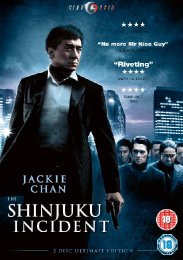


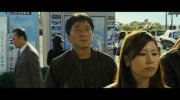


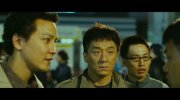
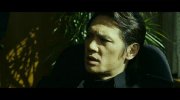

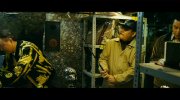
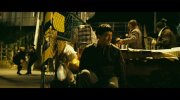

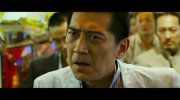
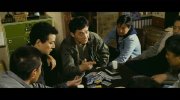

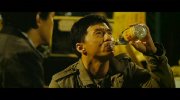
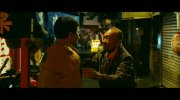
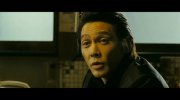
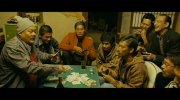

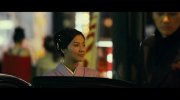
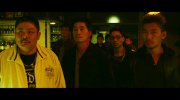
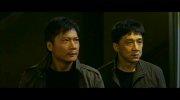
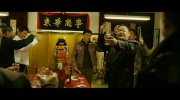
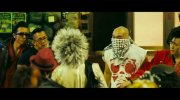

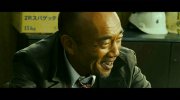











































Your Opinions and Comments